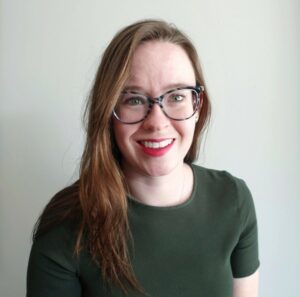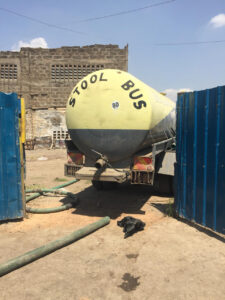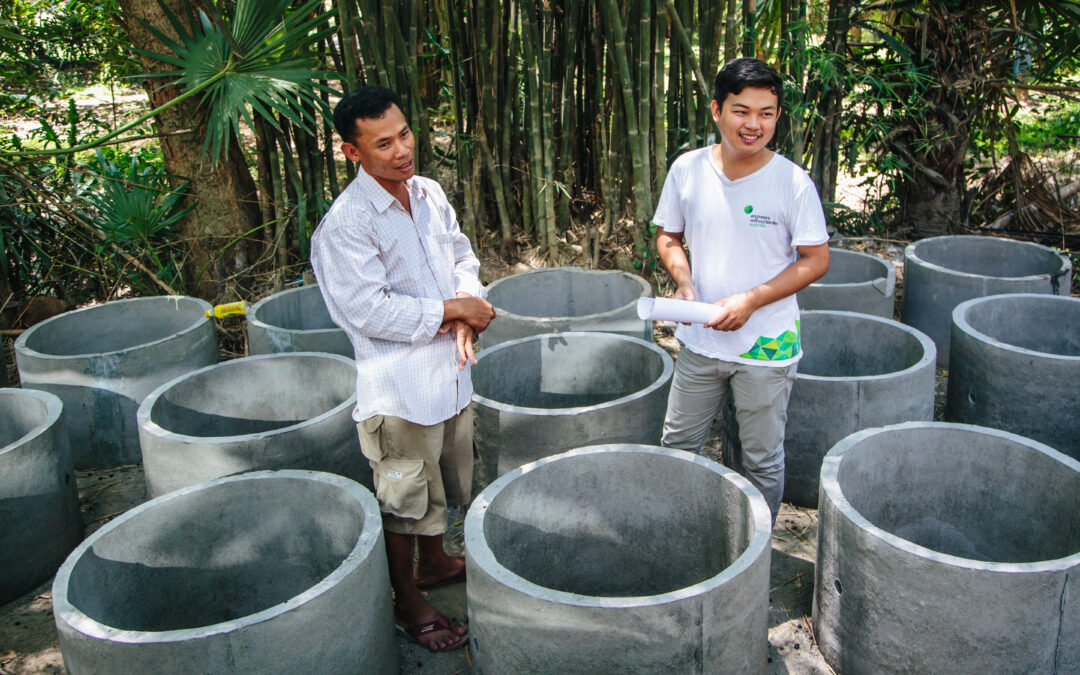Pictured: EWB’s Sanitation in Challenging Environment program is a focus of Leandra’s PhD.
A soon-to-be-published PhD thesis takes learnings from EWB’s Sanitation in Challenging Environment program to investigate the interlocking and compounding complexities that create inequalities in water and sanitation access for communities in challenging contexts.
Impact-led research for sector-wide learning
EWB’s research approach aims to deliver a meaningful contribution to the evidence base which will improve our work and the work of our sector. It is deeply collaborative, identifying and leveraging the different strengths of each group involved. Research outputs inform technology design, professional practice and policy development. Internally, we use research to measure our impact, inform strategic organisational decisions, deliver on community aspirations and ensure our programs are leading practice. Externally, we position our research to be utilised as a tool for influence, sector-wide learning and to drive positive change in the engineering sector. We conduct this impact-led research alongside our university partners. RMIT University is one such partner, currently supporting PhD candidate Leandra Rhodes-Dicker on a complex yet compelling topic.
From retrenchment to research

PhD candidate Leandra Rhodes-Dicker
Listening to her gut and healthy doses of bad luck and serendipity have seemingly been a constant in the career path of Leandra Rhodes-Dicker. As a Chemical Engineering graduate from the University of Calgary, Leandra was all set to kick-start her career in Canada’s oil and gas sector, until the industry fell over, and she was laid off before she even started. Instead, she started a Masters in Environmental Engineering at the University of Toronto, with a focus on water contamination. At the end of this coursework, her peers were heading into consulting gigs. But this didn’t feel right for Leandra. “Someone suggested that I contact EWB Canada who had a fellowship program. I was successful and brought on to work with Sanergy – a Kenyan-based organisation which develops solutions to systemic gaps in sanitation and waste management – to work on a project through EWB Canada. I literally tested poo from pit latrines in the informal settlements in Nairobi for a year – and loved it!” says Leandra. The year-long in-country project was cut short by COVID-19, and Leandra was given 24 hours notice to head back to Canada where she finished the work remotely.
Back home, it was a challenging time to be looking for work. “No one was hiring,” says Leandra, “but I got really lucky to find this PhD position in Australia that I thought was perfect for me and my background, and that I would be perfect for.” A project in partnership with RMIT University and EWB Australia, the brief was to research opportunities for water, sanitation and hygiene (known as WASH) in challenging environments, specifically in relation to EWB’s Sanitation in Challenging Environments program in Cambodia. Leandra’s application was successful, and she spent 15 months working on the assignment in Canada before moving to Australia in 2022.
EWB’s ‘fascinating’ Sanitation in Challenging Environments program
After starting, Leandra narrowed the PhD focus to investigate the interlocking and compounding complexities that create inequalities in water and sanitation access for communities in challenging contexts.
By challenging contexts, Leandra means settings such as informal settlements, refugee camps, or flood-affected communities which are impacted by persistent inequitable access to WASH. Ensuring appropriate WASH services in challenging contexts demands that practitioners have an understanding of contextual complexities. ‘Complexities’ refer to any factor that influences access to WASH and most, if not all, intersect to create compounded inequalities for entire communities or specific demographics.

A pit latrine emptying truck in Nairobi.
The research was focused on EWB’s Sanitation in Challenging Environments (SCE) program in Cambodia – a program that commenced in 2004. Leandra had already experienced the complexities and challenges first-hand with her work in Nairobi, but found that many of the same issues exist in Cambodia. She interviewed people who have been a part of EWB’s SCE program – many of them former volunteer field professionals – and was in awe of the incredible history of the program. “It’s wild!” says Leandra. “The program wasn’t formalised until 2015, but the history leading up to it – and after – is fascinating! There have been funding crises and global pandemics, as well as small, key moments like chats around a dinner table that led to a huge evolution in the program. EWB really made maintaining relationships with partners and volunteers a priority, and so many small steps evolved it into a full program run completely by a localised team. It’s interesting to consider how the program might have been managed through COVID-19 without that team in place. These key lessons – of being willing to adapt, to pivot – are things that are not always obvious when trying to build a WASH program, and it’s been so interesting to dive into over a decade of history to bring those lessons out.”
The PhD focus
Often, WASH practitioners try to simplify the complexity of challenging contexts, especially when it starts to affect an organisations’ ability to prioritise elements like inclusion. The problem is that simplified approaches frequently overlook important complexities and their interconnections which can result in WASH services that are not affordable, inclusive, or sustainable for communities. Leandra aims to create a transformational approach for practitioners to help them unpack intersecting complexities and ensure WASH programs are effective for those communities most left behind.
Underpinned by intersectionality as a research approach, Leandra’s study is exploring WASH practitioners’ perceptions of complexity in challenging contexts. This led to the intersecting complexities approach, which was developed and verified through a desk-based review, interviews, workshops and focus groups. The approach encourages practitioners to embrace complexity in WASH programs, prompting them to explore contextual complexity across multiple dimensions (e.g. environmental, political, social, temporal), consider the interconnections between complexities, and unpack the implications for various stages and scales of a WASH program.
The objective of the intersecting complexities approach is to transform conventional thinking in WASH programs and ensure that complexity is maintained and valued in decision-making processes. Leandra and her supervisors believe that the approach can help practitioners unpack compounded inequalities in challenging contexts, ultimately guiding them to ensure more effective programs and services. They aim to share this approach with the wider sector so that we may collaboratively tackle persistent inequalities in access to WASH.
Alongside her PhD, Leandra has been supporting the development of an approach to embed inclusion into university engineering courses, assisting as a tutor in RMIT’s delivery of the EWB Challenge and in supervising final-year undergraduate engineering projects.
Leandra has been supported at RMIT by PhD supervisors Dr Nick Brown (Senior Lecturer in Humanitarian Engineering) and Professor Matthew Currell alongside George Goddard, EWB’s University Impact Manager and Gaetano Romano, EWB’s Senior Engineering Manager. Other EWB staff across engineering, technology development, monitoring and evaluation, and our local team in Cambodia have also been key relationships for the research as well as two-way knowledge sharing. The EWB team is excited to apply the PhD findings across a number of different platforms of EWB’s work. Leandra hopes that the intersecting complexities approach developed throughout her research can support programs and increase impact at EWB, and beyond.
This research is currently undergoing validation through collaboration with Engineers Without Borders Australia and the Sanitation in Challenging Environments program in Cambodia to confirm practical application. Final reviews are set to be completed by October 2023. The first published paper can be found here.


